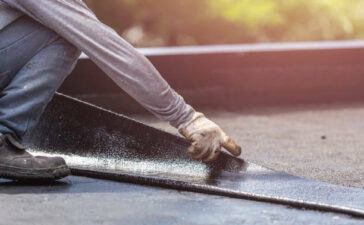The winter is already here, so it is imperative that you prepare your home for the upcoming freezing temperatures. One of the most important things you should do is check to see whether your gutters are working properly.
The truth is gutters play an important role in protecting the landscape of a property. Their main purpose is to guide rain and water off the roof and away from the foundation of the house.
Unfortunately, severe weather conditions can easily damage the gutters and cause them to be knocked down or break from getting clogged with leaves and other debris. In this case, you may need to find contractors close to you to provide you with a professional gutter installation so you can protect your home from further damages.
One crucial thing you should consider for this installation is what type of material is best to use. To help you, we’ve compiled a list of the best gutter materials for residential properties.
Aluminum gutters
Whether seamed or seamless, aluminum material is one of the most popular choices for rain gutters. They are relatively low cost and can last up to twenty years and more if they are properly cleaned and consistently maintained. They are also available in many styles, sizes and colors and can be easily customized to your home’s specifications.
Unfortunately, because of this material’s lightweight nature, it is more susceptible to denting and bending. As a result, if you choose this gutter material for your home, make sure you choose thicker gauge metal in order to get the most out of your gutters, especially if you live in an area with a lot of rain and snow.
Vinyl gutters
Vinyl is probably the least expensive material you should consider for your home’s gutters. It is another lightweight option which can be easily and quickly installed. Color choices may be limited, but you can paint the vinyl gutters however you want to suit your house’s exterior. Although the material won’t rot or rust, it can still become brittle in extreme cold and intense sun.
Because of its low-cost nature and PVC-made material, vinyl gutters can easily bend and bow when exposed to harsh weather conditions. That’s why regular maintenance is very important in order to protect them from leaks between sections and other similar cracks and damages.
Copper gutters
Copper material is another popular choice for gutters. Although it is more expensive, it offers that aesthetic appeal that can beautify a home and add to its value. It is very strong and durable and will likely never need replacement if it is properly maintained.
Similar to aluminum gutters, copper gutters can also be installed in sections or in a seamless design, depending on your home’s specifications. This makes its installation a bit more labor-intensive as they are rather heavy.
The biggest downside of copper gutters is that they will oxidize over time and turn green unless they are treated with sealants to give them a golden and shiny color.
Steel gutters
Steel is a gutter material that is known for its sturdiness and strength. This material is also very expensive and you can find it either in stainless or galvanized finish.
For example, stainless steel gutters never rust and can last up to many years, but due to their high cost, they are rare to find. That’s why homeowners choose galvanized steel gutters instead since they are comparable in price to aluminum gutters, but they are more resistant to rust, damage and thermal warping.
The biggest downside of galvanized steel gutters is the thin layer of zinc they are coated with which can deteriorate over time and rust.
Final thoughts
The importance of having good functioning gutters cannot be overlooked. These drains will protect your home from water damage and other issues that might cause further problems to the overall structure of your home in the long run.
In order to avoid dealing with gutter damages of any kind, it is essential that you choose a gutter material that is highly durable, longstanding and sturdy.
In case you need additional help with your decision-making, be sure you refer back to our guide and pick a gutter material that falls within your budget as well as suits your house’s needs.






